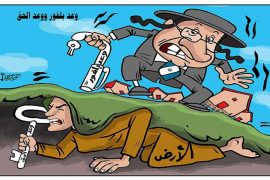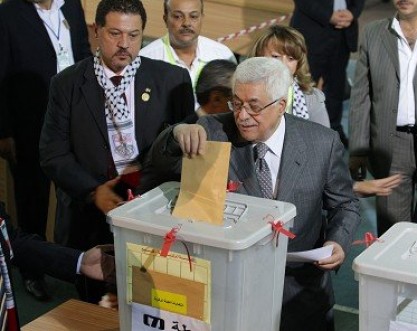(This is the second in a series of posts by CAMERA Arabic showing how Arabic language news networks, including those affiliated with Western media outlets, frame the topic of Jews who originate from or live in the Middle East and North Africa, by distinguishing between ‘loyal’ Jews and ‘treacherous’ Zionists. All translations, emphasis and in-bracket remarks are by CAMERA Arabic unless otherwise specified.)
Part 2:
The first post in this series (published on August 1st in BBC watch) was an analysis of an isolated incident which involved Jews native to Tunisia. It was there that an Israeli tourist of Tunisian descent praised both of her motherlands on camera during an Israeli news report, sparking protests in the North African country. The protestors called for a stop to Tunisian “normalisation” with the “Zionist entity” and demanded the sacking of the country’s Jewish minister of tourism, René Trabelsi.
As that previous post demonstrated, BBC Arabic’s attempt to cover the incident impartially was largely overshadowed by the network’s apparent need to set Israeli Jews (like the tourist) apart from supposedly “patriotic” Tunisian Jews (like Trabelsi) who, in the words of the report, “resist Israel’s temptations” and “cling to their Tunisian roots”.
The online report (and its accompanying TV program) also quoted social media comments in a manner inconsistent with BBC standards. A few commenters – which the report uncritically quoted in full – leveled baseless accusations against the Israeli tourists, suggesting they were performing a military act on Tunisian soil. One Facebook comment, which is still embedded in the BBC article, is outright antisemitic. It alleges that Trabelsi was usurping the role of President, rejects the distinction promoted by the Tunisian government between Zionists and Jews, and accuses them all of engaging in a conspiracy against Tunisia, its people and their Arab identity. The report did not denounce the comment, while the TV program selectively presented only the parts of it that were less hateful.
This second post aims to examine the debate that was already revolving around Tunisia’s small Jewish community in Arabic-speaking media outlets prior to this incident, and ever since a community member was appointed minister in November 2018.
The novelty of a Jewish minister in an Arab government received media attention from several directions, such as newspapers in Lebanon and Egypt, pan-Arab websites and the satellite television stations of the Gulf, Aljazeera and Alarabiya (all links are in Arabic). Via these outlets, reporters and columnists alike conveyed the critical attitude that dominated the Tunisian street following the appointment. In addition, they often uncritically echoed concerns that Trabelsi could turn out as a “normaliser” (of Israel) or even an outright “Zionist”.
One op-ed, written by the columnist Nizar Bulhiya, and published that month in the London-based newspaper “al-Quds al-‘Arabi”, accurately encapsulated the sentiment towards Jews and their alleged dual-loyalty, given the new situation; so much so that it can be seen as foreshadowing the challenges the newly appointed minister had to meet as soon as the Israeli tourist scandal broke out:
“The minister must acquire expertise […] in the [delicate] skill of marketing a new face for his [Jewish] community, which would allow most Tunisians to better distinguish between our Jewish citizens and the Zionist enemy. [This should be done by] providing them a role model of a patriotic Jew, who is able to defend [Tunisia’s] interests, refuses to normalize [relations] with the occupier [i.e. Israel] and does not indulge in Zionism”.
The op-ed, titled “Eyes of the Jews – [are they] on Tunisia or on Israel?”, also raised the distant possibility that one day Tunisia might have a Jewish president (a scenario that clearly haunted the anti-Semitic Facebook commenter mentioned before). It went as far as to predict quite accurately what accusations the minister and his community will eventually face should their credentials as devout Tunisians be placed in doubt:
“Perhaps this new experiment [i.e. Trabelsi’s term as minister] will […] lead members of the Jewish community out of their shell, and also help in knowing what side they choose between Tunisia and Israel. […] Tunisian Jews will be required to invest an extra effort to prove throughout René’s experiment that they are patriotic Jews, and never Zionists in Jews’ clothing. Once they succeed at that, it will be doors, not [only] windows that would be opened in front of them”
BBC Arabic’s coverage of the incident therefore merely expressed an existing trend, set in advance by other Arabic-speaking media outlets, which do not follow the same Western standards of journalism – especially when covering Jews and Israelis. At the end of the day they all relied on the same premise: only a clear distinction between ‘good Jews’ and Zionists could exonerate Tunisian Jewry and clear them of the charge of being “Zionists in Jews’ clothing”.
Research and writing by CAMERA Arabic. Edited by UK Media Watch.
Related Articles
- Jews in the Middle East in the eyes of BBC Arabic (BBC Watch)
- AFP Improves Article on Security Barrier (CAMERA)
- UKMW prompts ITV News correction to security fence omission (UK Media Watch)





